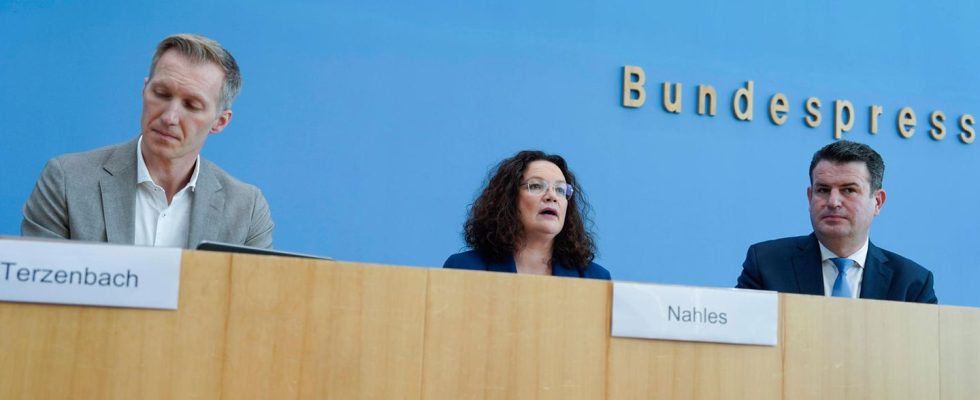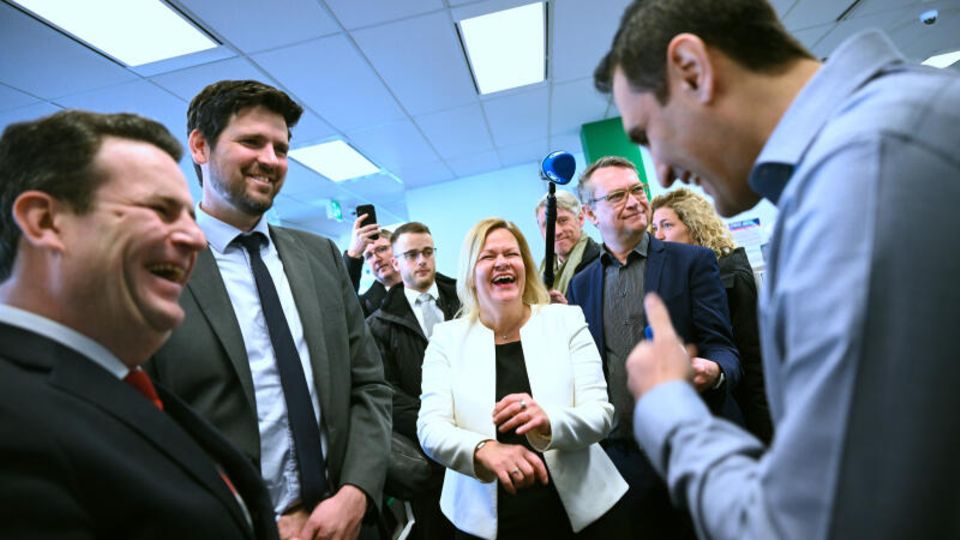integration
Heil wants to turn on the turbo to place refugees in jobs – it is unclear whether he will succeed
Daniel Terzenbach and Andrea Nahles from the Federal Employment Agency and Federal Labor Minister Hubertus Heil
© IMAGO / Bernd Elmenthaler
On Wednesday afternoon, Labor Minister Hubertus Heil presented a turbocharger for the labor market integration of refugees with Andrea Nahles and Daniel Terzenbach from the Federal Employment Agency. But for concrete measures they need support from others.
“Sometimes in the last few weeks you have the impression that reason is too quiet in Germany,” he blurts out at some point Hubertus Heil out. The Labor Minister is clearly no longer interested in the debates about refugees and migration – especially when it comes to his area, the labor market. That’s probably why he now wants to create facts. That’s why he’s sitting in front of the federal press conference on Wednesday afternoon with Andrea Nahles and Daniel Terzenbach from the Federal Employment Agency (BA).
Hubertus Heil likes to see himself as a pragmatic doer, and here too he wants to show energy. Others take care of the almost impossible tasks surrounding deportation, border controls and preventing irregular migration; he wants to get people to work. A task that is perhaps not unsolvable, but not an entirely easy one.
19 percent of Ukrainians who fled to Germany since the war and are able to work have now found employment. These are not enough. According to Heil, an additional 100,000 people have now completed an integration course and have German language skills at A2 level. So you can at least go shopping or talk to your neighbors in German. Another 100,000 are currently doing so. Another 200,000 are coming from other countries of origin who have completed a course or will do so in the next few months. Heil finds: 400,000 – that’s something. Now it’s time for a turbo.
Language in particular has been a problem so far
Until now, he notes, language skills have been a major obstacle in hiring refugees. They’re here now, now it’s time to get started. It is clear that “the journey from the refugee accommodation to the workplace is not a sure-fire success,” he says. But how the path should be taken remains unclear, even after the explanations at the federal press conference.
There should now be a special federal government representative for the labor market integration of refugees. Daniel Terzenbach, who is responsible for cooperation with the regions on the BA board, will take on this role. But as it is with special representatives: you usually need them when you don’t yet know exactly what needs to be done. In this case, this is mainly because Heil and BA boss (and Heil’s predecessor as Labor Minister) Andrea Nahles have a lot to hope for; in the end, success depends above all on others.
Terzenbach’s tasks in the new role are therefore to convince companies to hire refugees – even without perfect German. Many people complain about the lack of skilled workers, but if Heil has their way, some of them are still too hesitant to employ refugees. They should also be approached so that they can look for a job. Terzenbach wants to reach them with campaigns on social media and local clubs and lure them to consultations at the job center. He should talk to states and municipalities about the structures for child care and language courses.
More “customer contact density”
What exactly will come out of this is still unclear. Only one, not entirely insignificant change has already been decided: the job centers should meet these employable refugees who have completed integration courses every six weeks for a consultation. This is intended to eliminate obstacles such as a lack of qualifications or recognition more quickly. Nahles calls it “customer contact density.”
At the federal press conference, even she didn’t want to decide how promising this turbo would be in the end. There are many uncertain conditions: How will companies cooperate, how much money will the job centers get from the budget, can the professional recognition process really be accelerated? And that’s why at the end of the federal press conference the feeling remains that this turbo was announced primarily to bring a bit of reason back into the debate.



